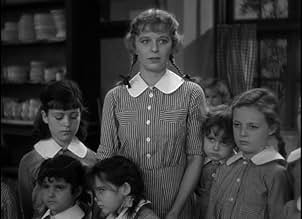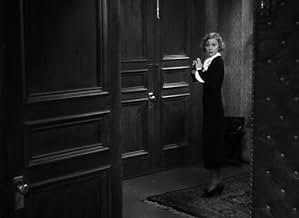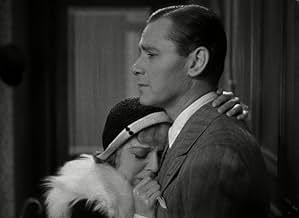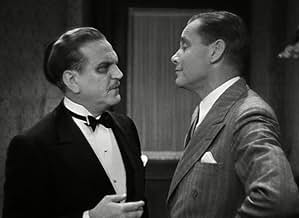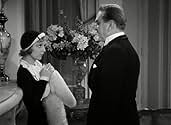PUNTUACIÓN EN IMDb
7,4/10
1,7 mil
TU PUNTUACIÓN
Una chica huérfana recién salida de un orfanato se da cuenta de lo mucho que complica la vida ser una "hada buena" para los desconocidos.Una chica huérfana recién salida de un orfanato se da cuenta de lo mucho que complica la vida ser una "hada buena" para los desconocidos.Una chica huérfana recién salida de un orfanato se da cuenta de lo mucho que complica la vida ser una "hada buena" para los desconocidos.
- Dirección
- Guión
- Reparto principal
- Premios
- 2 premios en total
Ted Billings
- Shoeshine Man
- (sin acreditar)
Alene Carroll
- Schoolgirl in Orphanage
- (sin acreditar)
Reseñas destacadas
I am always amazed with the talent of Preston Sturgis. He is a true painter of WORDS, a tunesmith of dialog and staging. In this early William Wyler Universal film using Preston Sturgis screen play we have scene after scene of people acting and reacting off each other's follies which is a true documentation of this race we call Human. This film depicts the constant struggle to make sense of human interaction.
The nice thing is there is no murders, explosions, mayhem or outright evil. All these things get in the way of DIALOG. I watch this film in awe, there is musical rhythm in the first third of the film combining dialog, action and music. You will really like all these people at the end of the film.
Time Well Spent., No Noise
The nice thing is there is no murders, explosions, mayhem or outright evil. All these things get in the way of DIALOG. I watch this film in awe, there is musical rhythm in the first third of the film combining dialog, action and music. You will really like all these people at the end of the film.
Time Well Spent., No Noise
The story of a naif who goes out into the world, skirts calamity (i.e. seduction, in the guise of Frank Morgan, no less), and finds true love (Herbert Marshall, who likewise should be better remembered--he'd a been a bigger star if he would have been five years younger when the talkies started in earnest). Of course, Sullavan the naif is the one who instructs the world weary cosmopolitans rather than vice-versi.
The script, being by Preston Sturges, is funny and witty and artfully plotted. Sullavan was a great actress/star of the '30's early '40's who unfortunately is mostly forgotten now. She has a quality, a sly subtle acidity that makes her different from other screwball heroines. She also had the knack of bringing out the tenderness in her male leads (James Stewart was never more suave, articulate, and keenly perceptive than opposite the funny cruel little egomaniac Sullavan in The Shop Around the Corner, which is a masterpiece, and she brought out the early best in her former husband, Henry Fonda, in The Moon's Our Home, which is another forgotten little gem). It's not so much she's vicious a la Bette Davis or the divine Barbara Stanwyck: she's too minutely picky, petty really in getting what she wants, too self-centeredly rational in getting her way for that. But, anyway, The Good Fairy has a younger softer Sullavan. The supporting cast is superior, too.
The script, being by Preston Sturges, is funny and witty and artfully plotted. Sullavan was a great actress/star of the '30's early '40's who unfortunately is mostly forgotten now. She has a quality, a sly subtle acidity that makes her different from other screwball heroines. She also had the knack of bringing out the tenderness in her male leads (James Stewart was never more suave, articulate, and keenly perceptive than opposite the funny cruel little egomaniac Sullavan in The Shop Around the Corner, which is a masterpiece, and she brought out the early best in her former husband, Henry Fonda, in The Moon's Our Home, which is another forgotten little gem). It's not so much she's vicious a la Bette Davis or the divine Barbara Stanwyck: she's too minutely picky, petty really in getting what she wants, too self-centeredly rational in getting her way for that. But, anyway, The Good Fairy has a younger softer Sullavan. The supporting cast is superior, too.
This has long been director William Wyler's hardest-to-find classic, a truly nutty, thoroughly charming romantic comedy written by the incomparable Preston Sturges (and very loosely based on a Ferenc Molnar play). All the Sturges touches that would later be his hallmarks as a director are here - the jaded wit, the almost dance-like physical comedy, the hilarious supporting cast of characters (the priceless Eric Blore, Frank Morgan, Reginald Owen, Beulah Bondi and Alan Hale, among others)... "The Good Fairy" is as much his as Wyler's. Margaret Sullavan is captivating as always as the pure-of-heart (and slightly loopy) heroine - a characterization she would come to perfect in later roles. As for Wyler, this was the first in what would be a string of classics in an astonishing number of genres. But here they are - Preston Sturges, Margaret Sullavan and William Wyler - near the beginning of their careers, already in classic form. Don't miss!
The 1930s were perhaps the golden age of the romantic comedy, and one way this is proved is by how many sub-genres the 30s romcom can be divided into. There were the "pre-code" bedroom farces, the screwball comedies which began with It Happened One Night, and the musical romcoms, which virtually all musicals were before they gained a layer of dramatic maturity in the 40s and 50s. The Good Fairy, as its title suggests, is a prime example of yet another sub-genre – the contemporary, urban fairy tale. The beautiful princess is a cinema usherette, the magical kingdom is a modern city, but this is still a simple yet sincere story of love conquering all.
These stories can seem a tad daft or childish, especially when compared to the sophistication and raciness of the classic screwballs. The Good Fairy however makes its innocent sweetness palatable by never getting too close to reality in its setting or situations. The Eastern-European location is reminiscent of the divine "Ruritanian" style of the early Paramount musicals. Preston Sturges's dialogue is witty enough to keep a continuous background level of silliness without threatening to distract from the plot. The original story, by the way, is by Ferenc Molnar, whose most famous work is Liliom (upon which Carousel was based) and while the Good Fairy is not supernatural there are many similarities in tone.
Director William Wyler could have treated the Good Fairy as a straightforward comic ramble, but he leaves the superb cast to bring out the funny business. He instead adds depth to the love angle, shooting as if this were a serious romantic drama. One significant trick he pulls is the in the pace he gives to different parts of the film. Margaret Sullavan's dinner with Reginald Owen and the scenes at the party are very busy, with the crowds in the background constantly moving, sometimes passing in front of the principle actors. This gives a daunting atmosphere and prevents the scenes from getting in any way romantic. In contrast, Sullavan's scenes with Herbert Marshall are at a more relaxed pace, in long unbroken takes, and this brings out the warmth of their moments together.
And now onto that sublime cast, which is surely the best thing about the Good Fairy. The picture opens with Alan Hale, who gets things off to a suitably silly start. Frank Morgan and Reginald Owen have a hammy bluster about them which adds to the aforementioned bustle of those early scenes. It may seem odd to see Eric Blore out of his familiar butler territory, but it's not a problem. Blore is so naturally entertaining I would quite happily watch him playing Lady MacBeth. Pushed and pulled between these oddballs, Margaret Sullavan gives the one naturalistic performance of the whole show, and a remarkable one at that. And then there is Herbert Marshall, one of the most intrinsically likable players of the era. It's odd, because Marshall looks and sounds a lot like George Sanders, but while Sanders looks like the kind of bounder who writes relatives out of his will on an annual basis, Marshall is the sort of man you'd trust with the pin code to your life savings. And that's why he works so well here. In fact, the only bad thing about Marshall's casting is that the barber is right – he really does look better with the beard.
There are really no flaws in the Good Fairy, at least none worth dwelling on. The only reason I wouldn't call it a masterpiece is that there is nothing supremely good about it. It is emotional without being poignant, funny without being hilarious. But the Good Fairy entertains, just as a square meal fills us up, and who would ask for a gourmet dinner every night of the week?
These stories can seem a tad daft or childish, especially when compared to the sophistication and raciness of the classic screwballs. The Good Fairy however makes its innocent sweetness palatable by never getting too close to reality in its setting or situations. The Eastern-European location is reminiscent of the divine "Ruritanian" style of the early Paramount musicals. Preston Sturges's dialogue is witty enough to keep a continuous background level of silliness without threatening to distract from the plot. The original story, by the way, is by Ferenc Molnar, whose most famous work is Liliom (upon which Carousel was based) and while the Good Fairy is not supernatural there are many similarities in tone.
Director William Wyler could have treated the Good Fairy as a straightforward comic ramble, but he leaves the superb cast to bring out the funny business. He instead adds depth to the love angle, shooting as if this were a serious romantic drama. One significant trick he pulls is the in the pace he gives to different parts of the film. Margaret Sullavan's dinner with Reginald Owen and the scenes at the party are very busy, with the crowds in the background constantly moving, sometimes passing in front of the principle actors. This gives a daunting atmosphere and prevents the scenes from getting in any way romantic. In contrast, Sullavan's scenes with Herbert Marshall are at a more relaxed pace, in long unbroken takes, and this brings out the warmth of their moments together.
And now onto that sublime cast, which is surely the best thing about the Good Fairy. The picture opens with Alan Hale, who gets things off to a suitably silly start. Frank Morgan and Reginald Owen have a hammy bluster about them which adds to the aforementioned bustle of those early scenes. It may seem odd to see Eric Blore out of his familiar butler territory, but it's not a problem. Blore is so naturally entertaining I would quite happily watch him playing Lady MacBeth. Pushed and pulled between these oddballs, Margaret Sullavan gives the one naturalistic performance of the whole show, and a remarkable one at that. And then there is Herbert Marshall, one of the most intrinsically likable players of the era. It's odd, because Marshall looks and sounds a lot like George Sanders, but while Sanders looks like the kind of bounder who writes relatives out of his will on an annual basis, Marshall is the sort of man you'd trust with the pin code to your life savings. And that's why he works so well here. In fact, the only bad thing about Marshall's casting is that the barber is right – he really does look better with the beard.
There are really no flaws in the Good Fairy, at least none worth dwelling on. The only reason I wouldn't call it a masterpiece is that there is nothing supremely good about it. It is emotional without being poignant, funny without being hilarious. But the Good Fairy entertains, just as a square meal fills us up, and who would ask for a gourmet dinner every night of the week?
Five years before she butted heads with James Stewart working at Matuschek and Co. in Ernst Lubitsch's classic pen-pal romance, "The Shop Around the Corner", Margaret Sullavan was playing another character living in Budapest, this time a naïve young woman chosen to become an usherette in an elaborate movie palace. This warm-hearted 1935 screwball comedy has impressive credentials beyond a luminous Sullavan in only her third film, as it offers a screenplay by Preston Sturges ("The Lady Eve") and direction from William Wyler ("The Best Years of Our Lives") who married Sullavan during the tempestuous production. Alas, this was their only collaboration since they divorced less than two years later, but this long-forgotten collaboration is a fruitful one as the then-25-year-old actress sparkles in a role that could have easily been cloying if Wyler didn't maintain the right tempo for Sturges' alternately scatterbrained and clever story.
Sullavan plays the improbably named Luisa Ginglebusher, a gregarious, pig-tailed orphan who regales the younger girls with her fanciful fairy tales. A blustery theater owner comes to the orphanage looking for girls to be silver-costumed usherettes at his Budapest movie palace. The head of the orphanage allows Luisa to accept the job on the condition that she performs at least one good deed a day in the real world. At the theater, Luisa meets Detlaff, a waiter who gets her an invitation to an exclusive party at which he is serving. She almost immediately has to hold off the bold advances of Konrad, a somewhat lascivious South American meat-packing millionaire who wants to seduce her and shower her with gifts. However, she isn't interested and lies about being married. When he insists on employing her "husband" so he can send him away, Luisa randomly picks a name from the phone book, hoping to do a good deed and divert some of Konrad's wealth to someone else. The lucky man is poor but proud Dr. Max Sporum, but complications obviously ensue when Luisa meets Sporum and Konrad finds out the truth.
Although she had few opportunities to play comedy, the adorable Sullavan shines in this type of shenanigan-driven farce, whether using her electric wand to point patrons to their theater seats or prancing with a multiplicity of her mirror images as she models a "foxine" stole at the department store. Reginald Owen (Scrooge in the 1938 "A Christmas Carol") gamely plays Detlaff with rubbery charm, while Frank Morgan (the Wizard in "The Wizard of Oz") is a bit too fey and downright wizardly as Konrad. Generally a tight-lipped presence on the screen, Herbert Marshall ("The Little Foxes") has never appeared more animated in a movie than he does as Sporum. Familiar character actors show up like Alan Hale as the cinema impresario, Beulah Bondi as the orphanage matron, a hilariously over-the-top Eric Blore (from all the early Fred-and-Ginger pictures) as a monocled drunk, and a menacing Cesar Romero as a pushy stage-door lothario. An unusual entry on Wyler's resume, this is quite a charmer thanks to Sullavan. The print is clear on the 2002 DVD, which includes the original theatrical trailer and a photo gallery as extras.
Sullavan plays the improbably named Luisa Ginglebusher, a gregarious, pig-tailed orphan who regales the younger girls with her fanciful fairy tales. A blustery theater owner comes to the orphanage looking for girls to be silver-costumed usherettes at his Budapest movie palace. The head of the orphanage allows Luisa to accept the job on the condition that she performs at least one good deed a day in the real world. At the theater, Luisa meets Detlaff, a waiter who gets her an invitation to an exclusive party at which he is serving. She almost immediately has to hold off the bold advances of Konrad, a somewhat lascivious South American meat-packing millionaire who wants to seduce her and shower her with gifts. However, she isn't interested and lies about being married. When he insists on employing her "husband" so he can send him away, Luisa randomly picks a name from the phone book, hoping to do a good deed and divert some of Konrad's wealth to someone else. The lucky man is poor but proud Dr. Max Sporum, but complications obviously ensue when Luisa meets Sporum and Konrad finds out the truth.
Although she had few opportunities to play comedy, the adorable Sullavan shines in this type of shenanigan-driven farce, whether using her electric wand to point patrons to their theater seats or prancing with a multiplicity of her mirror images as she models a "foxine" stole at the department store. Reginald Owen (Scrooge in the 1938 "A Christmas Carol") gamely plays Detlaff with rubbery charm, while Frank Morgan (the Wizard in "The Wizard of Oz") is a bit too fey and downright wizardly as Konrad. Generally a tight-lipped presence on the screen, Herbert Marshall ("The Little Foxes") has never appeared more animated in a movie than he does as Sporum. Familiar character actors show up like Alan Hale as the cinema impresario, Beulah Bondi as the orphanage matron, a hilariously over-the-top Eric Blore (from all the early Fred-and-Ginger pictures) as a monocled drunk, and a menacing Cesar Romero as a pushy stage-door lothario. An unusual entry on Wyler's resume, this is quite a charmer thanks to Sullavan. The print is clear on the 2002 DVD, which includes the original theatrical trailer and a photo gallery as extras.
¿Sabías que...?
- CuriosidadesMargaret Sullavan wanted control on the set of the movie, and did spiteful things to get her way. Script girl Freda Rosenblatt said: If she was tired and wanted to go home and Willy had one more scene to do, she would smear the makeup on her face. That would mean everything had to stop so she could be made up again. Which might take hours. So they couldn't shoot. Maggie got so bored between scenes she went behind one of the sets and purposely lay down on the dusty floor. The beautiful white dress she was wearing was a wreck. That stopped everything. -- Despite all this, she and Wyler fell in love and were married during the filming.
- ConexionesFeatured in WatchMojo: Top 10 Comedy Movies: 1930s (2014)
Selecciones populares
Inicia sesión para calificar y añadir a tu lista para recibir recomendaciones personalizadas
- How long is The Good Fairy?Con tecnología de Alexa
Detalles
Taquilla
- Recaudación en todo el mundo
- 7478 US$
- Duración1 hora 38 minutos
- Color
- Relación de aspecto
- 1.37 : 1
Contribuir a esta página
Sugerir un cambio o añadir el contenido que falta

Principal laguna de datos
By what name was Una chica angelical (1935) officially released in Canada in English?
Responde
